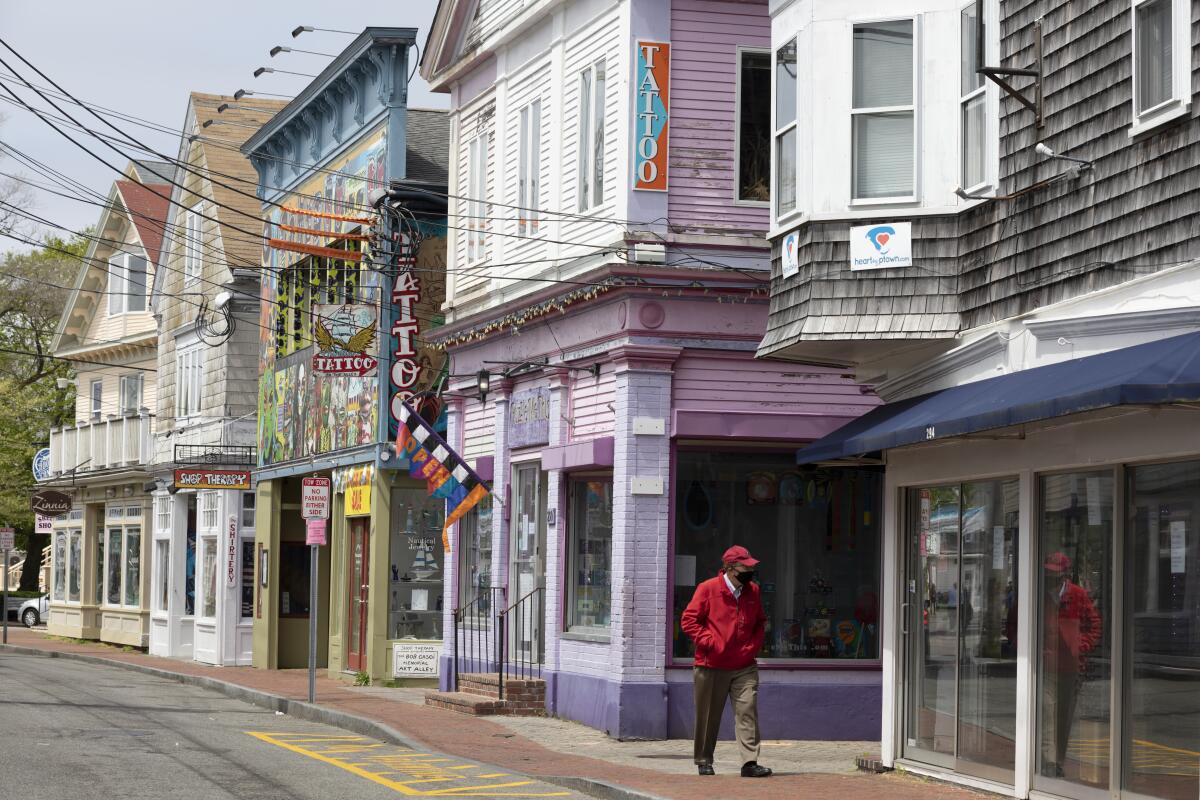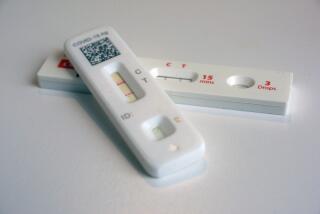Column: How the Delta variant shattered Provincetown’s brief moment of normalcy

- Share via
It’s a strange feeling getting caught in the middle of a storm you never saw coming. A couple of weeks ago I thought I was headed for a lovely vacation in Provincetown, Mass. I ended up in the eye of Hurricane Delta Outbreak.
“Be careful.”
“Get tested.”
“How is it there?”
The text messages from concerned friends came in a steady flow. My response was carefree.
“I’m fully vaxxed. I’m good.”
And, initially, everything about the Cape Cod scene supported my attitude. Shops were open, masks were off, the sun was shining. I sent reassuring replies while sipping dirty martinis, watching the tide roll in and out.
“Hot vax summer,” here I come.
During the Fourth of July week, nearly 60,000 people — many of them gay men — descended on this small beach town to let loose and celebrate after a year and a half of being alive but not feeling alive.
In a community that had already been decimated once by a deadly virus, many of us in the LGBTQ community took very seriously the protocols from the Centers for Disease Control and Prevention. We had friends and loved ones who survived the AIDS epidemic but were now left at high risk because of a compromised immune system. So we wore masks. We used hand sanitizer. We did not compare life-saving measures to Nazi Germany or whatever else the party of Rep. Marjorie Taylor Greene was trying to tell us — because we knew better.
And when the COVID vaccinations became available we thought we could once again live better, or at least better than what we had endured in 2020. We were aware of the Delta variant; we just didn’t think that had anything to do with us. After all, we were vaccinated.
There were hugs all around. Dinners in nice restaurants. Making out on the dance floor inside packed clubs with poor air circulation. (If your inner DaBaby wants to make an appearance, save it. I’ve been to Vegas and seen worse.)
I heard live music for the first time since February 2020. I went to a gym that wasn’t in my garage. I shook hands with strangers.
For a moment we had normal.
And then ….
Several of my friends in Provincetown had breakthrough infections, including one of my housemates. He self-quarantined in his room, fighting off a fever and exhaustion, while we left food and Gatorade at his door. Home COVID test kits waited for us on the kitchen counter next to disinfectant wipes.
Worried friends began texting me more. My responses became less carefree. I stopped going to the gym and shaking hands. The martinis didn’t stop flowing, but they were consumed only outside, delivered by a waiter wearing a mask.
The storm many of us didn’t know we were in, the storm my friends were reading about, finally made its presence known.
Normal was gone about as quickly as it came.
Or, rather, “normal” had changed, and we were slow to adapt.
Vaccination status, local infection rates, variants … these are now all hallmarks of what the shifting normal means today. Science is trying to keep up, most politicians are trying to keep up, we are all trying to keep up while also holding on to whatever it was that made us feel alive.
God, I missed feeling that alive.
But setting the needle to “normal” now is a constant reflection of our willingness to adjust our lives to protect ourselves and each other.
For gay men over 40 in particular, the thought of being hunted by an enemy you can’t see is not something any of us wish to relive. But it’s not a choice. It’s our reality. For young people who were led to believe youth would protect them, that myth has been debunked. And for those who believe mask mandates are akin to Nazi Germany — read more books and fewer tweets.
The danger is real, and at this moment it’s also really simple to minimize: Get vaccinated. Wear a mask. Stay tuned for further guidance as opposed to browsing conspiracy theories online.
When those precautions aren’t taken, or when they prove insufficient, we get news like those national headlines about the Delta variant in Provincetown — infecting 965 people, three-quarters of them vaccinated.
I can tell you from being there that this immaculate stretch of Cape Cod had another, underreported outbreak rapidly spreading: normalcy. The masses were starting to act normal again, and it was hard to contain. Putting the masks back on after tasting normalcy was miserable.
But I suspect being on a respirator, fighting for life, feels even worse.
More to Read
A cure for the common opinion
Get thought-provoking perspectives with our weekly newsletter.
You may occasionally receive promotional content from the Los Angeles Times.











